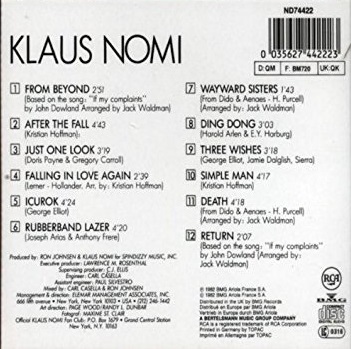The Atrocious Music Collection: #5 in a series
Artist: Klaus Nomi (1944 - 1983)
Album Title: Simple Man
Category: Alien DiscoYear: 1982
Cover art style: German, so very German
Audio samples: Ding, Dong, the Witch is Dean, Death (from Purcell’s Dido and Aeneas)
Acquisition: Brought to the Atrocious Music Party by Joe and Heidi Klein.


The spirit of the Atrocious Music Party was, ”Bring your worst, and we’ll listen to it!” I’m forever grateful that Joe and Heidi Klein embraced that spirit and brought Klaus Nomi's Simple Man to the party. Years later, they also alerted me that there is a documentary about Klaus Nomi, The Nomi Song (2004). You should really watch it. Documentaries are “in,” and both the subject matter and the execution make this a worthwhile way to spend 90 minutes. And that’s not just me – it’s 94% fresh on Rotten Tomatoes.
Due to the presence of this fine movie, I’m going to resist telling you anything about Nomi beyond the bare essentials. He was German-born, and retained a noticeable accent when he sang in English. He sang things like a disco version of Ding, Dong, the Witch is Dead as well as the Saint-Saëns aria Mon cœur s'ouvre à ta voix. The latter was performed straight up, at soprano-pitch, in a countertenor falsetto, while Klaus is dressed like an alien, in front of hip late-1970s East Village audiences, who were wowed by him. He also appeared as a back-up singer to David Bowie for a Bowie appearance on Saturday Night Live. I think that should be enough information to get started.
On his second album, Simple Man, Nomi shows the breadth of his ability. There’s opera (Purcell’s Dido’s Lament, retitled Death, from the 1689 opera Dido and Aeneas). There’s awful disco with a Western touch: (I’m going to lasso you with my) Rubberband Lazer. There’s great American songbook songs ruined through the “disco-fication” process so prevalent in atrocious music circles (Falling in Love Again). There are songs written expressly for Nomi, including the title track where the refrain (“I’m a simple man”) tends to get the reply of “No you’re not, Klaus” from the listener.
There’s hardly a dull moment here, is what I’m saying.
And always there is the voice – really voices, as Nomi inhabits so many personas. For any singer, it’s ultimately about the voice. Why listen to Sinatra singing Fly Me to the Moon over the Legendary Stardust Cowboy’s version? Or Johnny Cash’s I Walk the Line instead of Telly Savalas’ take?
Take, for example, After the Fall, where Nomi gives us his “low” voice in the verses, heavily accented and gruff, but busts out with his falsetto operatic soprano for the chorus, soaring above it all. One is not likely to mistake him for anyone else.
One more fact about Nomi: he was openly gay at a time when that was not nearly as common as it is now. Death was reported to be his homage to the victims of AIDS, the new disease that was killing gay men, and the disease that would take his life in 1983. As happened so often, in the pre-internet world, all of us enjoying his music at the A.M.P. had no clue about the context for Nomi’s art, only this incredibly odd artifact, adrift in time.
It was, one audience member reports in the documentary, like he was from a different planet. His association with Bowie suggests Nomi, like Bowie, might have also been a man who fell to Earth, but perhaps Nomi fell from a slightly more distant world than Mars.
